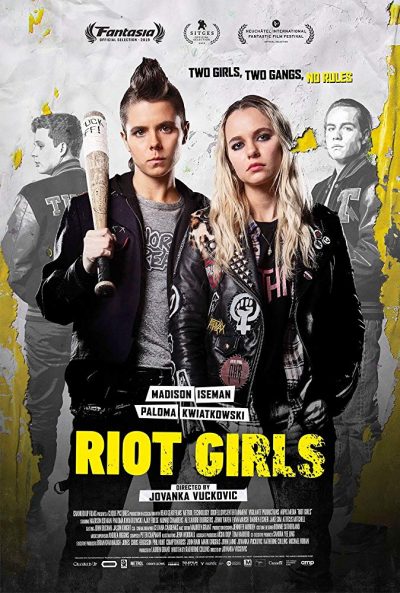★★
“Two girls, one gun.”
 After a disease has wiped out all adults, the town of Potters Bluff has divided into two camps, delineated by the river running through the town. On the west are the Titans, a quasi-fascist order of jocks operating out of the old high school and led by Jeremy, whose motto is “Strength, power, respect.” On the east are the free-spirited remainder, living under and protected by Jack (Bourgeois). However, after hijacking the contents of a Titan truck, Jack is abducted by them and held hostage. A three-person party sets out on a rescue mission: Jack’s sister Nat (Iseman), her best friend – and painfully obvious lesbian, right down to the mohawk – Scratch (Kwiatkowski), and Sony (Friese), a former Titan who recently defected to the East, and whose inside knowledge is essential to their survival and the success of the mission.
After a disease has wiped out all adults, the town of Potters Bluff has divided into two camps, delineated by the river running through the town. On the west are the Titans, a quasi-fascist order of jocks operating out of the old high school and led by Jeremy, whose motto is “Strength, power, respect.” On the east are the free-spirited remainder, living under and protected by Jack (Bourgeois). However, after hijacking the contents of a Titan truck, Jack is abducted by them and held hostage. A three-person party sets out on a rescue mission: Jack’s sister Nat (Iseman), her best friend – and painfully obvious lesbian, right down to the mohawk – Scratch (Kwiatkowski), and Sony (Friese), a former Titan who recently defected to the East, and whose inside knowledge is essential to their survival and the success of the mission.
This provides a slightly different twist on the usual post-apocalyptic scenario, though the idea dates back at least to Roger Corman’s 1970 film Gas-s-s-s, in which a deadly gas wiped out everyone over the age of 25. Canadian show Between also explored similar territory, and the conflict-driven nature here brings us almost into Battle Royale territory. Though it’s more of a team sport than an individual pursuit, and natural division instead of artificial construct. But I have to wonder, how did Potters Bluff reach this point? What’s the back story which saw, for example, Jack and Jeremy become leaders of their factions and implacable enemies? I suspect this may have been more entertaining than what we actually get. And why is the soundtrack apparently fascinated with hair metal songs from a long bygone era? [I’m pretty sure it shares one with the 35-year-old Return of the Living Dead…]
After a bright, comic-book styled opening sequence to set the scene, at first it seems this may be building and then subverting expectations. For example, when on a foraging expedition, Scratch is delighted to come across a vibrator… But in a twist, her interest is purely for the batteries it contains. However, the further on it goes, the safer and more predictable everything seems to become. The hurdles Nat, Scratch and Sony have to overcome on their journey, are precisely the ones you’d expect (although there is one eye-poppingly brutal head-shot), and it all inevitably leads to a confrontation with Jeremy and his troops in their high-school gymnasium.
Most irritatingly, it ends up getting too bogged down in class and gender politics. The Titans are largely defined as the bad guys almost purely because they are white, straight and male. Meanwhile, it’s “diversity = good” for the Eastsiders – even if its tenets like affirmative action are a civilized conceit, which wouldn’t last two days in a proper apocalypse. Consequently, it’s absolutely no surprise Nat and Scratch end up as An Item – not minutes after the former has spurned a heterosexual advance, and while Nat’s brother is still in the clutches of his enemies. I guess, for some, the line between free love utopia and devastated dystopia is severely blurred.
Dir: Jovanka Vuckovic
Star: Paloma Kwiatkowski, Madison Iseman, Alexandre Bourgeois, Ajay Friese




